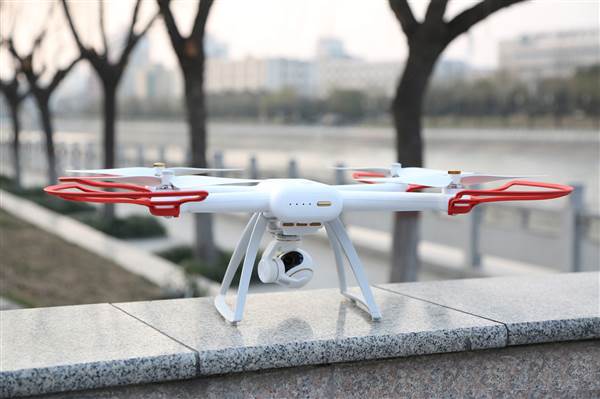In 2015 Huawei and Xiaomi announced they would come in with their own drones soon. The first quadcopter with Xiaomi branding on board we saw last year. But there were a few shortcoming many customers didn’t apply. Probably, the most eye-catching of them concerned the 1080p video recording capability. Full HD is not bad, but they wanted 4K resolution. The Chinese manufacturer took this factor into account, and we were introduced the Xiaomi Mi Drone 4K a few days back. There were made over 400 optimizations and 5 major hardware updates in comparison to the 1080p version. So this quadcopter is promised to provide great performance. It’s priced at 2999 yuan ($436), and it’s going to hit the market on March 3. So we decided to get our hands on it and get acquainted with the key features of the Xiaomi Mi Drone 4K.
- Lens FOV: 104 degrees
- Video resolution: 3840×2160p 30 fps / 2560×1440p 30 fps / 1920×1080p 100/60/30 fps [MP4]
- Photo resolution: up to 4000×3000 4: 3 [JPEG]
- Battery: 5100mAh / 77.52Wh
- Flight time: 27 minutes
- Controlled rotation range: Tilt: —90 ° ~ 0 °
- Maximum flight speed: 18 m/s
- Lifting speed: Max climbing speed of 6 m/s (Novice Mode – 4 m/s); Lowering speed of 1.5 m/s
- Hovering Accuracy: Vertical: + / – 0.1m (working in the ultrasonic range), + / – 0.5m Horizontal: + / – 1.5 m
- Wheelbase: 434 mm
- Propeller length: 25.4 cm
- Weight: 1376g

Xiaomi Mi Drone 4K Box Content
This quadcopter comes in a white package. The drone is dissembled. So you have to install everything yourself.
Inside the box we can find:
- 1 x Mi Drone 4K
- 1 x 5100mAh battery
- 1 x Transmitter
- 1 x 4K camera
- 4 x propellers
- 4 x protection ring
- 2 x landing legs
- 1 x cable
- 1 x USB charging cable
- 1 x Screwdriver
- 1 x Instruction manual
- 1 x Adapter
- 1 x USB flash memory stick.




















In comparison to the 1080p version the Xiaomi Mi Drone 4K uses two sets of independent heterogeneous IMU and compass sensor. Such a combination is met found rarely on UAVs. It helps the drone in providing better flight real-time monitoring by merging data from both sensors.

This drone uses 1.2mm ultra-thin lightweight body design process. It weighs only 670 grams, which can be considered as a record for such kind drones. So unlike many other quadcopters the Mi Drone 4K looks more stylish, but this change doesn’t affect the battery and the lifetime. As you guess, the improvements refer to the battery and lifetime as well. Thanks to 5100mAh battery (actually there are four separate 4.35V high voltage lithium polymer batteries) it can provide up to 26 minutes of continuous flight time.



The Xiaomi Mi Drone 4K comes with a 12MP Sony back-illuminated sensor, which is capable of recording videos at 3840 x 2160 pixels resolution. Moreover, it saves the files in RAW format. This product is based on new TDMA technology, which means it provides an anti-jamming performance significantly stronger than the traditional Wi-Fi scheme. Moreover, the Xiaomi Mi Drone 4K now supports transmission distance from the original 1km to 4km.



This camera is packed with a 3-axis brushless self-stabilizing pan, built-in 3-axis gyroscope, 3-axis accelerometer and 3-axis brushless motor driver. So it is capable of providing up to 2000 times better data acquisition and operation compensation.
Every time we talk about this drone we mention there have been made more than 400 software improvements. But this statement doesn’t mean anything to a novice. In other words, Xiaomi has developed a special app allowing to control the Mi Drone UAV easily. You can generate routes, set up automatic takeoffs and landings as well as a destination, flying around a given point and automatic return.







As for security, when the battery power is too low, the drone returns to the starting point. The same will be implemented if the connection is suddenly lost. Finally, you can track the location of the Xiaomi Mi Drone 4K in real time by GPS.


![[World Sleep Day] Recovering From Daylight Saving Time May](https://loginby.com/itnews/wp-content/uploads/2025/03/1741688395_World-Sleep-Day-Recovering-From-Daylight-Saving-Time-May-238x178.jpg)




